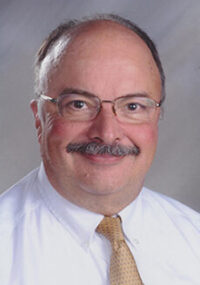Expect a miracle at Mass this Sunday

By Tim Irwin
18th Sunday in Ordinary Time/Aug. 2
Isaiah 55:1-3; Psalm 145:8-9,15-16,17-18; Romans 8:35,37-39; Matthew 14:13-21
All creatures great and small eat in order to live. Long before we learn how to speak, read, write, or even use the porcelain facilities, we learn how to feed ourselves. No surprise, then, that dining serves as a frequent metaphor in the Gospels for people gathering in community to receive grace. This Sunday’s Gospel recounts the most reported miraculous event in the Gospels. Once in each of the four Gospels Jesus feeds 5,000 or more. Mark says 5,000. Matthew says 5,000 men plus women and children. In addition, both Mark and Matthew recount a similar story of the feeding of 4,000.
Six times, Jesus feeds a multitude of people. The details vary, but the point seems consistent throughout: Just as our bodies hunger for food so that we might continue to live, our souls hunger for God so that we might live eternally.
This week’s reading from Matthew, like its parallels in the other Gospels, occurs in a Jewish area. Herod has just executed John the Baptist and the apostles have returned from their first mission to the Children of Israel.
It’s worth noting that earlier in Matthew, when Jesus dispatched them on their first mission, he told them to proclaim that the “Kingdom of Heaven is at hand” and back it up with miracles. Jesus told them to cure the sick, raise the dead, cleanse the leper, and drive out the demons (Matthew 10:08). Apparently, said instructions generated no apprehension among the apostles as the Gospels record none. Despite what might appear to us to be a very challenging mandate, the Twelve took it in stride.
NOT ONE AND DONE
What Jesus didn’t tell them to do was to feed the hungry. Well, not then anyway. The instruction to feed the multitude comes after they returned causing a surprising amount of consternation among the men who had just been out on their own curing the sick, raising the dead, cleansing the leper, and driving out the demons. When the story is told by Mark and John, a disciple says that feeding this crowd would cost 200 days wages or in other words, you can’t be serious?
The significance of the bread of life — we call it the Holy Eucharist — far outweighs any of the healing miracles because it invites us to be transformed into our better more Christ-like selves.
Raising the dead, no problem, but dinner for 5,000, seriously? Then Jesus multiplies the fishes and the loaves. He gives the food to his disciples, who in turn give it to the crowd and the implication is as serious as a heart attack. What these events suggest is that this bread of life constitutes the more important miracle than even raising the dead.
Healing miracles validate the claim that the Kingdom of Heaven is at hand, but the effects of the miracle don’t last. The recipients get sick, again, or die, again. The significance of the bread of life — we call it the Holy Eucharist — far outweighs any of the healing miracles because it invites us to be transformed into our better more Christ-like selves.
The whole point of being Catholic is to become our better more Christ-like selves in this life and best, most Christ-like selves in eternity. If we wish to get more out of the celebration of the Holy Mass on this or any other Sunday, we should attend with the genuine intention of being transformed into our better more Christ-like selves. We should pray every day that we come to love the Father as Jesus does and others as Jesus loves them. Keep in mind this is not a one and done deal; it’s a slow, sometimes painful daily struggle.
Receive the Holy Eucharist this Sunday realizing that this is the miracle that will give our daily struggle to be more Christ-like its ultimate meaning and someday carry us into eternity.
—
Tim Irwin teaches theology and philosophy at Notre Dame High School in Peoria. He is a member of Blessed Sacrament Parish in Morton.





